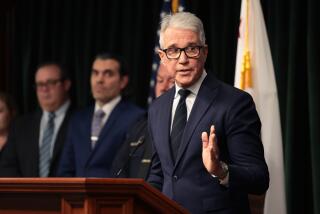Credit Lyonnais Fraud Suit Dismissed
- Share via
A federal judge Thursday threw out a lawsuit by California Atty. Gen. Bill Lockyer accusing Credit Lyonnais and others of fraud in the French bank’s 1993 acquisition of the assets of failed Executive Life Insurance Co.
The suit, filed almost a year ago, claimed Credit Lyonnais circumvented a state law barring foreign ownership of insurance companies by hiding behind phony business fronts to purchase the insurance company’s junk bond portfolio for $3.2 billion.
Credit Lyonnais and its partners sold some of those bonds and made a profit of at least $2 billion, authorities have said, while policyholders lost an estimated $4 billion. Lockyer sought $6 billion in damages for violations of the state’s false claims and unfair competition law, as well as the federal anti-racketeering act.
In dismissing the suit, U.S. District Judge A. Howard Matz ruled that the state insurance commissioner, who also has a lawsuit pending, has exclusive standing to pursue the case under state law.
Spokeswoman Sandra Michioku said Lockyer was considering his next move, which could include an appeal to the U.S. 9th Circuit Court of Appeals. “We will be reviewing the court’s ruling to determine what the next appropriate steps would be, and we’ll be looking at what legal avenues there are to pursue,” she said.
The litigation stems from then-Insurance Commissioner John Garamendi’s 1991 seizure of Los Angeles-based Executive Life in what was characterized at the time as the nation’s largest insurance company insolvency. A consortium of French investors won the bidding to acquire the company and its high-risk junk bonds, which had a face value of $6 billion.
Policyholders sued to stop the sale, arguing that the value of the bonds was higher than the $3.2-billion price Garamendi had agreed to. But a judge overseeing the sale allowed it to go forward in 1993.
A few years later, a whistle-blower alleged that Credit Lyonnais was the true purchaser and had conspired to conceal its role. That disclosure triggered a wave of lawsuits charging fraud against the bank and its partners, including one by then-Insurance Commissioner Chuck Quackenbush, two by policyholders and Lockyer’s.
Matz already had thrown out the two policyholder suits on the grounds that the state insurance commissioner had exclusive standing to press the case. The U.S. 9th Circuit Court of Appeals upheld the dismissal of one of the suits last month and has yet to rule on the other.
The policyholders and Lockyer--but not the insurance commissioner--accused deal broker Apollo Advisors and several of its principals of participating in the conspiracy. Policyholders allege Apollo earned $500 million on the deal that should be returned to them. If Matz’s dismissals stand, the Apollo defendants are off the hook because they obtained the insurance commissioner’s release from liability last year in exchange for testimony.
Apollo lawyer Michael Weiner had criticized the Lockyer suit as baseless. He could not be reached for comment Thursday.
Thomas Schaefer, the San Diego lawyer representing policyholders, said money Apollo earned on the deal should go to policyholders if it is determined the sale was illegal.
“Even if [Apollo President Leon] Black and Apollo didn’t know about the fraud, the commissioner should pursue the profits,” he said. “They got something they didn’t deserve because of a phony deal. They shouldn’t get to keep it.”
More to Read
Inside the business of entertainment
The Wide Shot brings you news, analysis and insights on everything from streaming wars to production — and what it all means for the future.
You may occasionally receive promotional content from the Los Angeles Times.









